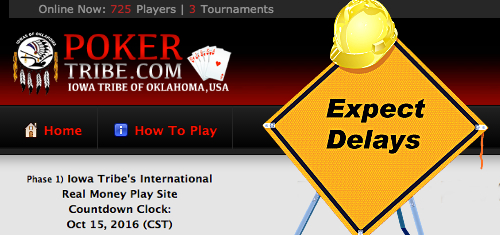 The Iowa Tribe of Oklahoma has delayed the launch of its real-money online poker site by two-and-a-half months. On Monday, the tribe issued a statement saying the planned Aug. 1 real-money launch of PokerTribe.com had been pushed back until Oct. 15. The delay was blamed on the need to “coordinate with foreign governments on the worldwide launch” of the real-money site. PokerTribe launched as a free-play site in May and Iowa Tribe chairman Bobby Walkup claimed to be “pleased with the progress” the site had made toward its real-money goal. Oklahoma’s governor and federal courts have okayed the tribe’s plan to offer online gambling services to residents of other countries. The delay is said to be necessary for the tribe and its technology partner Universal Entertainment Group (UEG) to “finalize the international country by country gaming licensees and international merchant processing banking.” The message claimed that the site would eventually offer banking services from Visa, Mastercard, Discover, American Express and “our European banking partners.” Although the statement didn’t mention it, the tribe has also pushed back its plan to offer online gambling services to commercial jet passengers. Originally scheduled for Jan. 9, 2017, the PokerTribe clock counting down to the InSkyCasino airborne launch now specifies a Jan. 15 target. Regardless of when PokerTribe launches real money play, its ultimate success remains an even bigger question mark. Neither the tribe nor UEG has explained how they will convince international players – many of whom reside in jurisdictions already offering legal online gambling options – to gamble with an unknown site with an interface that can charitably be described as ‘retro.’ The uncertainty of garnering the player liquidity needed to make a real-money poker site work is believed to have contributed to UEG’s original Oklahoma tribal partners throwing in the towel rather than throw more money after the $9.4m they’d already given UEG founder Freridoun ‘Fred’ Khalilian, who in a previous life was ordered to pay $4.2m to resolve a deceptive telemarketing case brought by the US Federal Trade Commission.
The Iowa Tribe of Oklahoma has delayed the launch of its real-money online poker site by two-and-a-half months. On Monday, the tribe issued a statement saying the planned Aug. 1 real-money launch of PokerTribe.com had been pushed back until Oct. 15. The delay was blamed on the need to “coordinate with foreign governments on the worldwide launch” of the real-money site. PokerTribe launched as a free-play site in May and Iowa Tribe chairman Bobby Walkup claimed to be “pleased with the progress” the site had made toward its real-money goal. Oklahoma’s governor and federal courts have okayed the tribe’s plan to offer online gambling services to residents of other countries. The delay is said to be necessary for the tribe and its technology partner Universal Entertainment Group (UEG) to “finalize the international country by country gaming licensees and international merchant processing banking.” The message claimed that the site would eventually offer banking services from Visa, Mastercard, Discover, American Express and “our European banking partners.” Although the statement didn’t mention it, the tribe has also pushed back its plan to offer online gambling services to commercial jet passengers. Originally scheduled for Jan. 9, 2017, the PokerTribe clock counting down to the InSkyCasino airborne launch now specifies a Jan. 15 target. Regardless of when PokerTribe launches real money play, its ultimate success remains an even bigger question mark. Neither the tribe nor UEG has explained how they will convince international players – many of whom reside in jurisdictions already offering legal online gambling options – to gamble with an unknown site with an interface that can charitably be described as ‘retro.’ The uncertainty of garnering the player liquidity needed to make a real-money poker site work is believed to have contributed to UEG’s original Oklahoma tribal partners throwing in the towel rather than throw more money after the $9.4m they’d already given UEG founder Freridoun ‘Fred’ Khalilian, who in a previous life was ordered to pay $4.2m to resolve a deceptive telemarketing case brought by the US Federal Trade Commission.
Iowa Tribe of Oklahoma delays real-money PokerTribe.com launch
